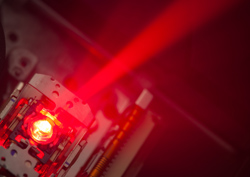Optical lasers light up the electronics world
Optoelectronics refers to electronic devices that produce, detect and control light and certain forms of radiation. It is a technology used in transistors, circuits, imaging devices, lasers and fibre-optic communications, among others. Perhaps the best known example of this technology is light emitting diodes (LEDs), today used to illuminate anything from appliances to vehicle instrumentation. One area of this technology is called organic based optoelectronics, which uses organic compounds such as carbon. This makes the technology inexpensive, lightweight, flexible and eco-friendly. Thus, organic optoelectronics offer many advantages over traditional or inorganic counterparts. A consortium of research partners, backed by EU funding, embarked on a project to create what is known as an 'Organic electrically pumped laser' (OEPL). The project team used cutting-edge organic circuits and semiconductors to overcome the main difficulties of the new laser. Such lasers have a profound impact on science, technology and communications. They can be used in a variety of applications and are more effective than their predecessors and can interact with more types of materials such as glass, polymers and silicon. While both Japan and the US have been experimenting with this technology, the team managed to make important headway. Three patents were filed which leave the door open for possible exploitation of the results in the future, with a general consensus that the project results were highly successful. Disciplines from physics to optoelectronics stand to benefit significantly, and the EU is already showing its leadership in this area.







